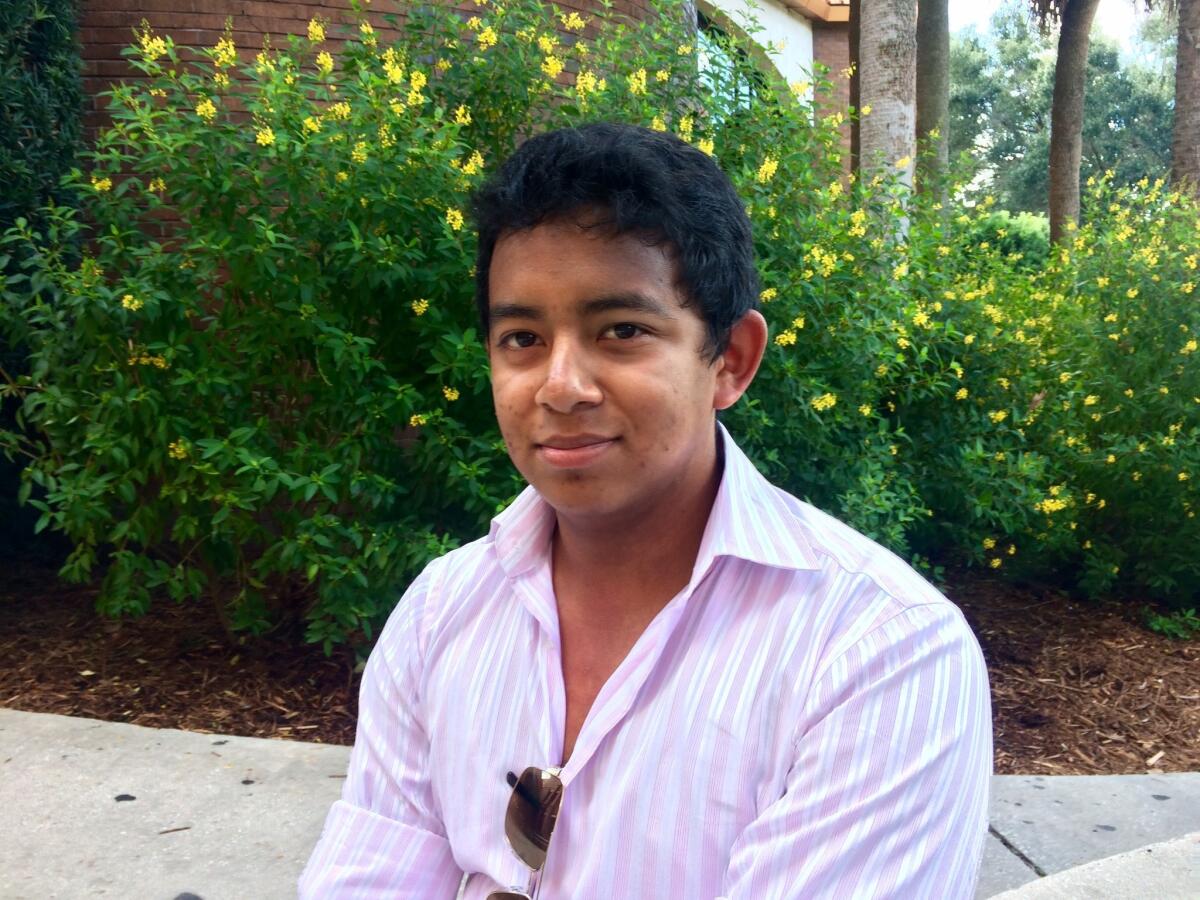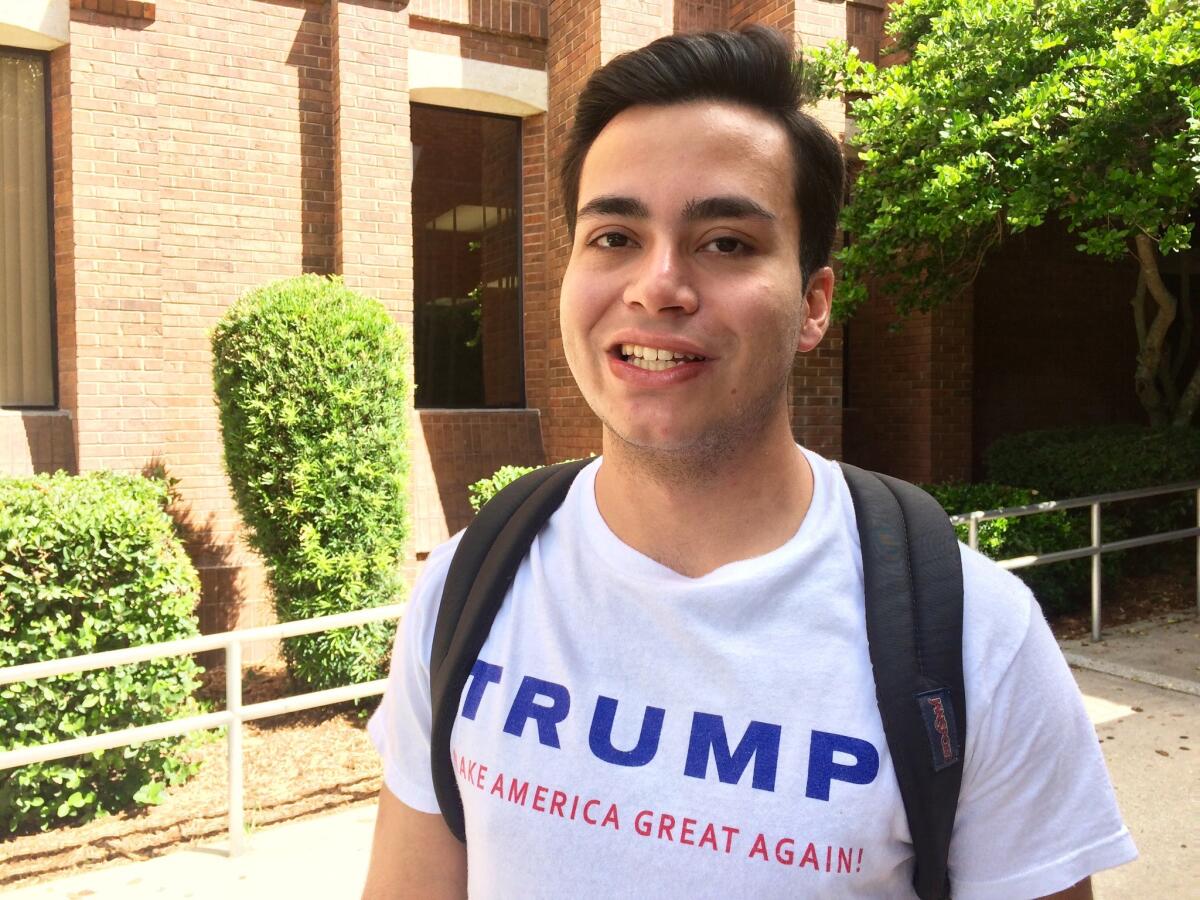Pro-Clinton millennials could make the difference in the swing state of Florida – but there’s a catch

- Share via
Reporting from Orlando, Fla. — Walter Velasquez stood outside the Student Union near the center of campus, beaded with sweat under a blazing sun, as he cheerily called out to passing students, “Have you updated your voter registration?”
Five hours a day, three times a week, the 19-year-old volunteer wields his clipboard at the University of Central Florida, trying to sign up as many young voters as he can in hopes of electing Hillary Clinton president.
Four years ago, Velasquez knocked on doors for Mitt Romney, the Republican nominee, but he can’t abide Donald Trump and his showman’s style of campaigning.
“I’ve never taken him seriously,” said Velasquez, the son of Honduran immigrants, who takes politics and political involvement very seriously.
Contrary to the stereotype, Florida is no longer a wheezy haven of shuffleboard, blue rinse and early-bird specials (with a bit of Latin spice). Millennials now outnumber residents over age 65, and the sentiments of young voters could make the difference in this perennial swing state.
They also represent a huge question mark for Clinton as she seeks to rebuild the coalition that twice ushered Barack Obama into the White House.
When Velasquez brings up the presidential election with friends and peers, he finds them either uninterested or disgusted.
“They’ve been turned off,” said the history and political science major, pausing in the shade of the hulking Mathematical Sciences Building. “They’re not really interested in any of the candidates, so they’re not paying attention.”
Polls show the Democratic nominee easily outdistancing Trump in support among younger voters, who are more apt to be nonwhite and politically moderate to liberal; here in Florida, nearly half the voters under age 30 are either Latino or African American.
It is far from certain, however, that millennials nationwide will turn out in sufficient number for Clinton to offset Trump’s advantage among older white voters, especially men; their mobility makes young voters harder to register and millennials participate at much lower rates than their elders.
There also is the letdown after the barricade-storming enthusiasm of Bernie Sanders’ insurgent campaign, though for some the presence of Trump atop the Republican ticket has been enough to bring them around to the more conventional Clinton.
“He’s probably the worst candidate in my lifetime,” said Brandon Kozlowski, 35, a political independent and healthcare student here at the nation’s second-largest university, a palm tree-lined complex with the feel of a suburban office park. He backs Clinton “mainly just to not have Trump as president.”
The millennial generation — those born between the dawn of the Reagan administration and the deadlocked 2000 presidential contest — now match baby boomers as the biggest share of the American electorate, each accounting for about a third.
Fretting over the youth vote is nothing new for Democrats; in 2012 Obama barnstormed college campuses into late October as polls suggested a significant drop in support and enthusiasm from his history-making 2008 campaign. He ended up winning 60% of the vote among those 30 and under, down from about two-thirds in his first run for president.
The difference this election is the presence of two high-profile third-party candidates, the Green Party’s Jill Stein and Libertarian Gary Johnson. Their support among young voters adds a new layer of worry to Democrats’ perennial concern.
The closeness of the contest could be determined, as Harvard pollster John Della Volpe put it, by whether millennials “vote for Hillary Clinton, Gary Johnson or for sitting home on the couch.”
A stew pot of cultures and contradictions, Florida is the nation’s ultimate swing state; with 29 electoral votes, the third-highest total, it offers by far the largest number still up for grabs. (California’s 55 electoral votes are a lock for Clinton and Texas’ 38 are all but certain to go to Trump. New York, which also has 29 electoral votes, is safely in Clinton’s column.)

Florida is, of course, the state Republican George W. Bush won in 2000 after six weeks of legal and political skirmishing, which ended only after the Supreme Court stepped in with a 5-4 decision handing Bush the White House. His official margin of victory was 537 votes out of nearly 6 million cast.
Bush won the state again in 2004, then Obama carried Florida twice — the last time by less than 1 percentage point.
Over those four presidential contests, 30.5 million ballots were cast, and the difference between Democrats and Republicans, a 71,000-vote GOP advantage, works out to a margin of 0.24%, according to Democratic strategist Steve Schale.
No other state in the country, he said, was closer.
“We basically start as a push,” he wrote in a recent strategy memo. “That’s Florida. Everything is about the margins.”
Here, as elsewhere, Clinton and Trump are a study in campaign contrasts.
The Democrat has staffers and volunteers on a dozen college campuses conducting daily registration drives and her campaign hosts regular events — brunches in the gay community, meetings with young parents, happy-hour socials — aimed at older millennials. (That represents just a fraction of Clinton’s organizing efforts in the state; with 65 field offices, the operation is vastly larger than anything Trump has put together.)
The GOP nominee is piggybacking on get-out-the-vote efforts of the state and national Republican parties, which are also focused on Sen. Marco Rubio’s reelection and several competitive congressional races.
To reach millennials, Trump is counting as well on word-of-mouth from supporters like Samon Hazrati, who admires his business background and tough talk on immigration.
The 21-year-old mechanical engineering student strode into the math building wearing a Trump T-shirt, which he rotates with a “Hillary for prison” shirt. A lot of hostility toward Trump results from “misrepresentation through the media and out-of-context quotes,” Hazrati said, and he is glad for the chance to set fellow students straight.
Clinton and her allies worry, too, about misconceptions — especially with polls showing a significant number of young people see no difference between the Democratic and Republican nominees. For some old enough to remember, that brings back unhappy memories of 2000, when the same argument was heard among supporters of third-party candidate Ralph Nader, whom many Democrats blame for Al Gore losing the White House.
With an apparent eye on young voters, Clinton has talked up issues such as climate change, which Trump minimizes, college affordability and criminal justice reform. All are significant concerns of millennial voters.
She has turned to Sanders for testimonial and Tuesday stumped alongside Gore at a Miami community college, where the former vice president cited “the election of 2000 and what happened here in Florida.”
“Your vote really, really, really counts,” said Gore, in a rare campaign appearance. “A lot. You can consider me as an Exhibit A of that.”
More than Trump or Johnson, indifference may be the biggest challenge Clinton faces to win millennials’ support.
Meghan Piotrowski, 20, a Clinton backer and political science major, was recently signing up voters at the University of South Florida in Tampa when, she said, a student brushed by with a dismissive, “We’re screwed either way.”
“It’s disheartening,” Piotrowski said. “But I don’t think there’s a resounding lack of hope in America’s youth toward this election.”
She and others she knows are excited about casting their first vote for president.
Clinton is counting on them.
Twitter: @markzbarabak
ALSO
Donald Trump says the shackles are off — and his first target is his fellow Republicans
While other Republicans have fled Donald Trump, Mike Pence is doubling down on their campaign
The women Trump invited to the debate do little to shed light on any bad behavior by Hillary Clinton
More to Read
Get the L.A. Times Politics newsletter
Deeply reported insights into legislation, politics and policy from Sacramento, Washington and beyond. In your inbox three times per week.
You may occasionally receive promotional content from the Los Angeles Times.











